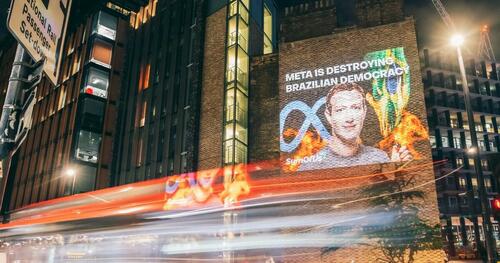Lula Supporters Accuse Meta Of Fueling ‘Election Disinformation’ As Brazilians Head To Polls
Authored by Brett Wilkins via Common Dreams,
As Brazilians are going to vote in Sunday’s decisive presidential runoff, a report published Saturday revealed that social media giants Meta—Facebook’s parent company—and TikTok are driving traffic to content promoting a military coup to overthrow Brazil’s democracy.
The report—entitled Stop the Steal 2.0: How Meta and TikTok Are Promoting a Coup—was published by the San Francisco-based activist group SumOfUs and asserts that “on the eve of the second vote in Brazil’s most important election in decades, Meta and TikTok continue to put the integrity of the election on the line through their disastrous recommendation systems.”
The publication comes ahead of Sunday’s second-round contest between far-right incumbent Jair Bolsonaro—who has said he may not accept the outcome of the election if he loses–and former leftist President Luiz Inácio Lula da Silva. Aggregate polling showed the two candidates in a statistical dead heat on Friday.
According to the new report:
Meta claims that Brazil is a priority region and that the company is committed to enforcing policies and practices that uphold the integrity of the vote. But not only does SumOfUs’ previous research show that the platforms are awash with conspiracy theories about the election, claims of electoral fraud, and calls for a military coup, this research report sets out how Facebook’s recommender systems are actively pushing users towards this content.
Far-right extremists, who are openly agitating for a military coup, are operating freely on Meta’s platforms, and Meta is not only allowing them to spread their message and recruit new members, but the platform’s algorithms are prioritizing anti-democratic groups, accounts, and posts. The report also looked at the role TikTok is playing in tackling the growing problem of election disinformation on its platform, and found its moderation lacking…
The findings confirm civil society organizations’ worst fears, that platforms like Facebook and Instagram are enabling bad actors to organize and recruit new members, just as it did in the U.S. 2020 elections, which ended in violent insurrectionists storming the U.S. Capitol on January 6th.
“At this point, it is safe to say that Meta has become Bolsonaro’s official disinformation machine,” SumOfUs campaign director Flora Rebello Arduini said in a statement. “This is not Meta’s first time wreaking havoc on democracy and Brazilians deserve better from this multi-billion dollar company.”
“As this report shows,” she added, “TikTok needs to up its game and not follow Meta’s lead in fueling the disinformation crisis in Brazil.”
The last 2 major polls for Brazil’s run-off for the presidency:
Datafolha: Lula (52%) – Bolsonaro (48%)
Ipec: Lula (54%) – Bolsonaro (46%)
Election is tomorrow. Unlike the US, Brazil fully counts all ballots nationwide in a matter of hours. Result will be known tomorrow night. pic.twitter.com/dPVf4poaUd
— Glenn Greenwald (@ggreenwald) October 29, 2022
On Saturday evening, SumOfUs activists projected an image of Meta co-founder and CEO Mark Zuckerberg setting the Brazilian flag alight with the message “Meta is destroying Brazilian democracy” at Kings Cross tube station in London, just around the corner from Meta’s U.K. headquarters.
The new report comes amid warnings and acts of right-wing political violence. While no motive has yet been announced, on Friday local São Paulo-area politician Reginaldo Camilo dos Santos, a prominent supporter of da Silva and the left-wing Workers’ Party running for Congress, was assassinated in a drive-by shooting near his home in Jandira.
Agência Pública, an independent Brazilian investigative journalism outlet, reported earlier this month that from August 16 and the end of the first round on October 2, there were at least 148 cases of electoral violence across the country.
A separate report published last week by the anti-corruption and human rights organization Global Witness revealed that YouTube approved 100% of Brazilian election misinformation ads submitted for approval, while Facebook accepted around half of such submissions.
Tyler Durden
Sun, 10/30/2022 – 10:55

